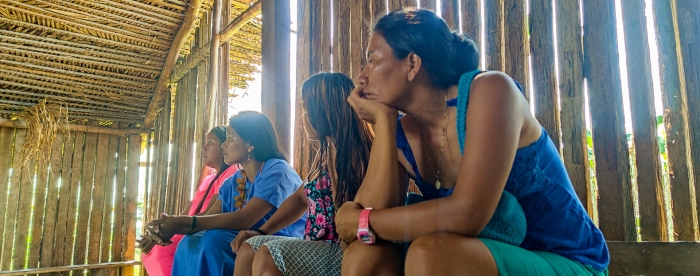News
Our stories ... ...

Colombia - 23 May, 2022
“We met, we were happy to meet. It was the first time we worked together only with women, and it was the first time we were in charge” said Alexandra Gutiérrez Piranga, a Korebaju indigenous woman when explaining how, through a process of building confidence and skills, they are on track for formulating projects for their own well-being and the well-being of their communities.
This was not always the case. When Tropenbos Colombia first entered Solano, indigenous Korebaju people, especially the women, did not participate in dialogues and hardly responded to proposals. That struck Tropenbos Colombia immensely.
After the presentation of the Working Landscapes programme with an ample group of representatives of peasant and indigenous communities, some Korebaju women approached Tropenbos Colombia and told them that they wanted to participate but felt they did not have the tools to do so. Due to the conditions of isolation the armed conflict imposed over their territory, they felt they had a great disadvantage compared to peasant and other indigenous women.
This is how a tailor-made process began with the Korebaju women. The Korebaju people have suffered of violence throughout their history starting with the exploitation of rubber in the last decades of the nineteenth century. More recently they have experienced horrific episodes of violence associated with the Colombian armed conflict like displacement, massacres, rape, and forced recruitment. Many families are affected and still hold the scars of violence.
On the other hand, in recent years, the territory of the Korebaju people have suffered because of the presence of illegal armed groups, establishment of illegal coca crops, drug traffickers and extractivism of natural resources such a timber and oil exploitation. This has impacted their traditional way of living by imposing economic models that become corrosive for traditional communities.
Read more: The impact of oil exploitation in the indigenous resguardos of the Colombian Amazon
Although the Korebaju indigenous group is divided in two indigenous government organizations (ASIMC and CRIOMC), the women asked for a joint process, expressing their interest in overcoming these political divisions and in building bridges among the organizations. As a matter of fact, Ruby Maura Piranga and Maribel Valencia, the representatives leading the gender issues in these organizations have become great allies and have managed to bring together the Korebaju women recognizing the importance of working together (sorority) in gender issues. Their interest in working together despite the political divisions is also a sign of their comprehensive view of the territory and the well-being of their communities.
As part of the work related to strengthening inclusive governance, a series of encounters were designed among the Korebaju women. In two general meetings that have been organized so far, Tropenbos Colombia encouraged the exploration of cultural ideas on gender, the role of women in their families and communities, the characterization of their specific relationship with the territory, and their contribution to the care of the territory. In addition, they have started to share information on women’s rights, and specifically the discussions on indigenous women’s rights. In these meetings, Tropenbos Colombia has accompanied a process of emotional exploration, which has resulted in an acknowledgment of the internal (intrafamily) and external (armed conflict) scars and traumas left by the violence.
“We want to strengthen our culture and traditions, our language, our mother tongue, that has been with us since we were babies and that is the language of our babies. We want to celebrate our culture and we wish to have the support to do so. (Alexandra Gutiérrez Piranga, Korebaju indigenous woman)”
A first result of the work with the Korebaju indigenous women is a list of medicinal plants and trees of importance for women that is now being used as part of the planting schemes of the Participative Productive Restoration projects that Tropenbos Colombia promotes in the Solano area.
Additional to the meetings a training process for the formulation and management of projects has also started. Among the projects being formulated are initiatives related to material culture, more specifically weaving, the strengthening of vegetable plots, and uses of medicinal plants. These proposals can help them to strengthen the traditional role in food security and explore entrepreneurial possibilities.
The Korebaju women are learning how to formulate their proposals and to present them to the local indigenous organizations and institutions. They are becoming active agents in the management of their territory. They are even planning the construction of a Korebaju women's house to follow up on these and other processes. Such a place would be a great innovation in indigenous traditional organization and a collective proposal that may inspire other women in the region.